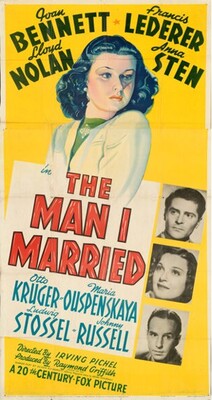Plot
A successful, yet naive American woman, art critic Carol Cabbott, is married to German Eric Hoffman. They have a seven-year-old son, Ricky. They travel to pre-World War II Nazi Germany during the occupation of Austria and invasion of Czechoslovakia, to visit Eric's father, whom he has not seen for ten years, although everybody tells them that going to Nazi Germany is foolish. A friend, Dr. Hugo Gerhardt, asks them to deliver money to, and somehow help his brother, the famous philosopher Ernst Gerhardt, who has been arrested and imprisoned in the concentration camp Dachau.
When the Hoffmans reach Berlin, they are met at the station not by Eric's father but by Frieda, the former wife of Eric's old schoolmate and best friend. Eric's father, an elderly director and owner of a factory, tells them he wants to sell everything and leave Berlin, as he can no longer stand the hostile atmosphere. Even his butler is a Nazi, and Frieda is always around Eric as the plot progresses. An active and enthusiastic Nazi, Frieda invites Eric to Nazi Party gatherings until he no longer wants to return to America, but wants to keep the factory and remain in Nazi Germany. His wife, Carol, however, feels uneasy about staying there, and as time passes she recognizes her husband less and less.
While Eric attends Nazi gatherings, Carol tries to find out about Gerhardt, with the help of Kenneth Delane, an American foreign correspondent in Berlin who has a prophetic understanding of the demise of Nazi Germany. They find out Gerhardt has been killed in Dachau, so Carol gives the money to Gerhardt's widow. They witness scenes of deliberate cruel denigration of people by Nazis in the streets, and Carol begins to awaken to the true situation of Germany under Nazi control.
Carol suspects Eric of infidelity with Frieda, and Eric admits to Carol that he wants to marry Frieda. Carol reluctantly agrees, but they quarrel over custody of their son. Eric refuses to allow Carol to leave Germany with his son, whom he wishes to raise in the Nazi Party. Finally, Eric's father warns Eric that if he does not let Ricky return with Carol to the United States, he will go to the police and tell them that Eric's mother was a Jewess. Eric is devastated to learn of his heritage, and Frieda, who witnessed the interaction, is disgusted by this revelation of Eric's parentage and leaves the house exclaiming that he is a "Jude" (German for "Jew"). Carol and Ricky leave for New York. Delane, who had hoped to get a leave to go back home, takes them to the station and tells Carol he has to stay "for the duration."
This page is based on this
Wikipedia article Text is available under the
CC BY-SA 4.0 license; additional terms may apply.
Images, videos and audio are available under their respective licenses.
